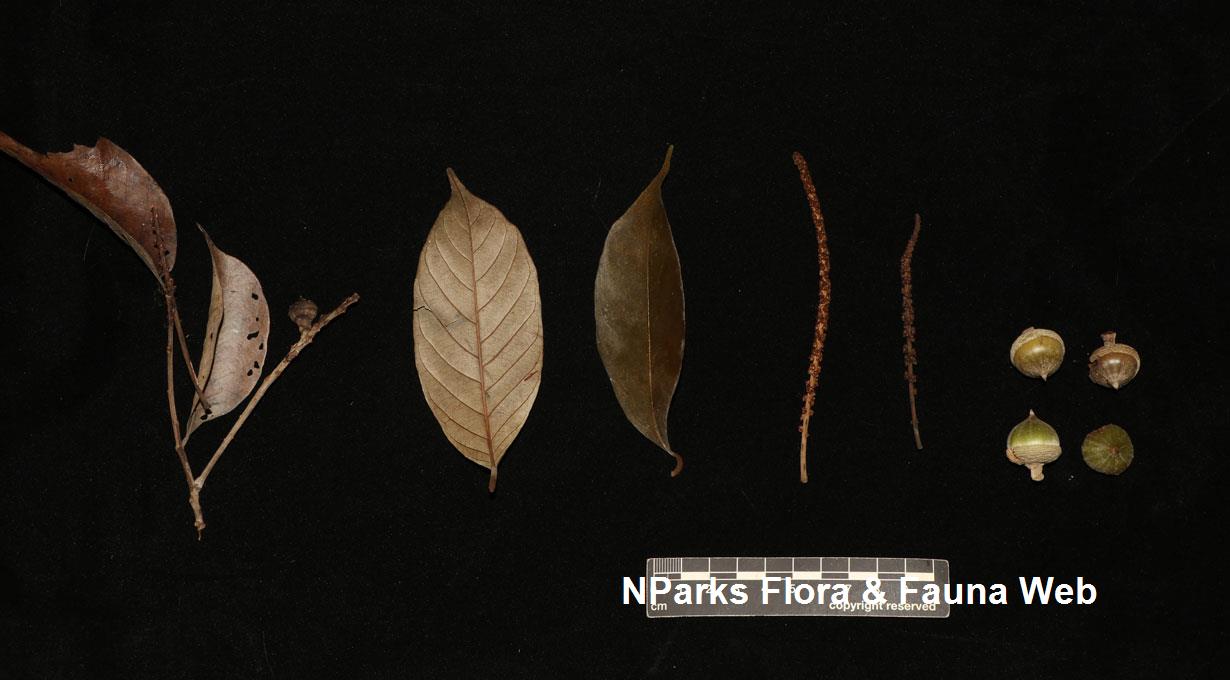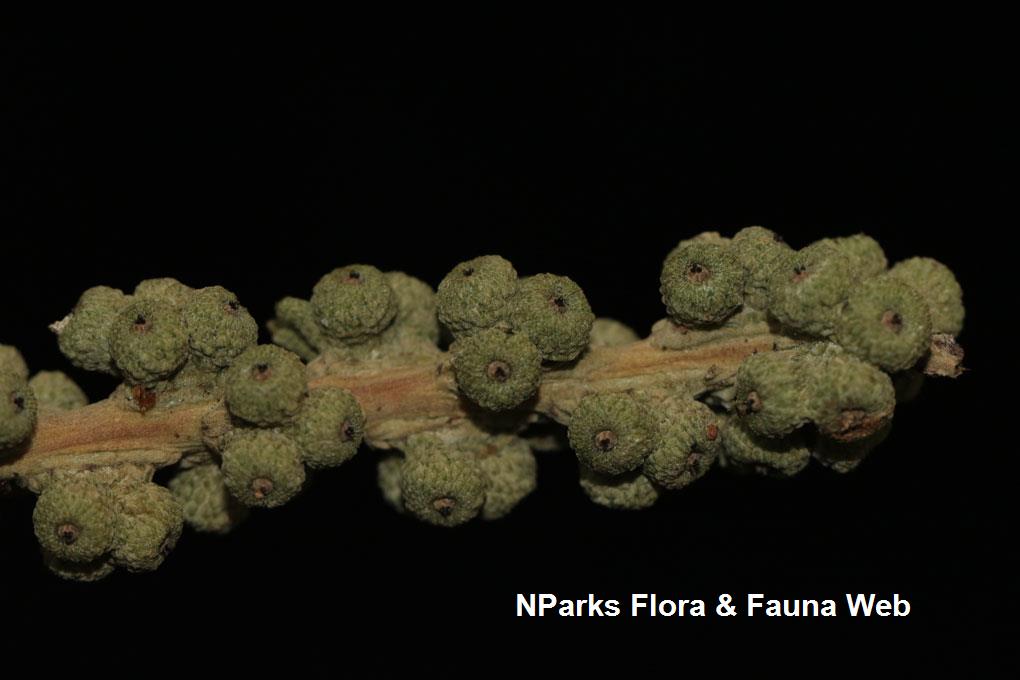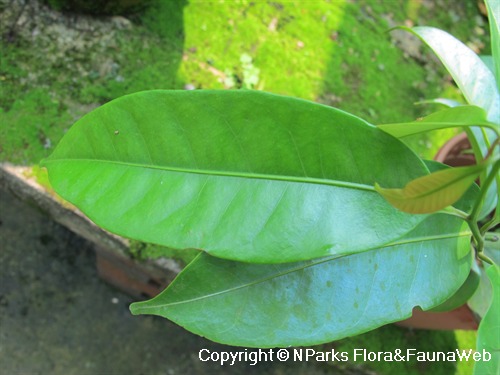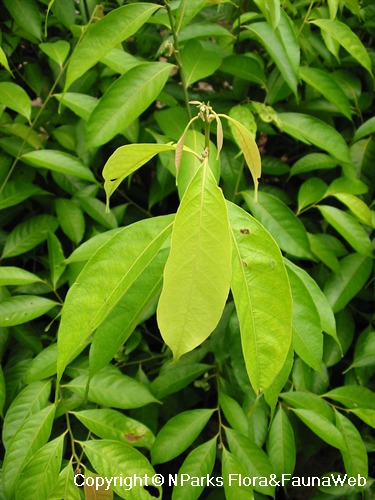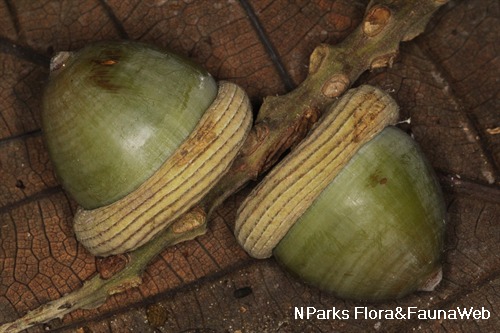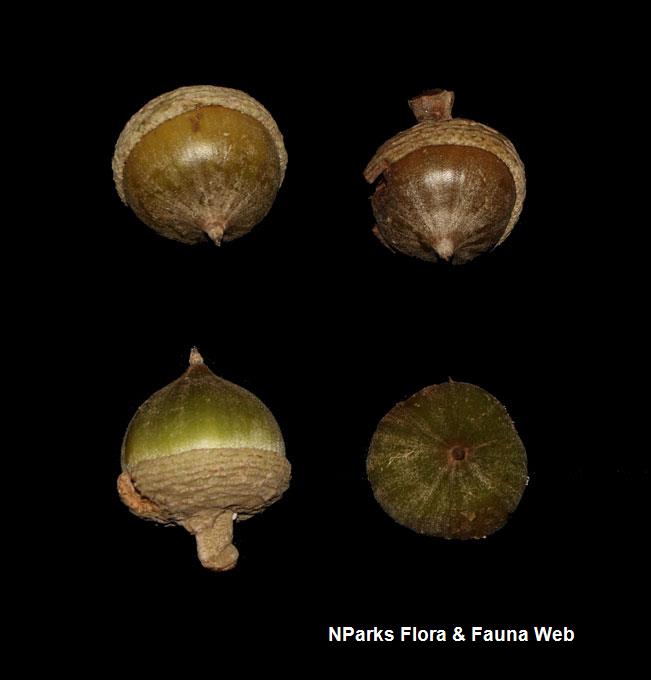
Back
Lithocarpus ewyckii (Korth.) Rehder
| Family Name: | Fagaceae |
| Synonyms: | Quercus ewyckii Korth., Pasania ewyckii (Korth.) Gamble, Pasania lamponga (Miq.) Gamble var. ewyckioides Gamble, Pasania ewyckii (Korth.) Gamble var. latifolia (King) Gamble |
| Common Name: | Mempening |
Lithocarpus ewyckii or Mempening is a tree native to Singapore. Growing to 30 m tall, it has thin leathery, elliptic to oval-shaped leaves with yellowish to greyish brown velvety hairs on the underside. Flowers are monoecious held on an inflorescence covered in dense yellowish hairs. The fruit is an oval nut with dense, greyish, velvety hairs held by a velvety, cup to saucer-shaped cap (cupule) covering the basal part of the fruit.
Name
Classifications and Characteristics
| Plant Division | Angiosperms (Flowering Seed Plants) (Dicotyledon) |
|---|---|
| Plant Growth Form | Tree (Big (>30m)) |
| Maximum Height | 50 m |
Biogeography
| Native Distribution | Sumatra, Malay Peninsula, Singapore, Borneo |
|---|---|
| Native Habitat | Terrestrial (Primary Rainforest, Secondary Rainforest, Freshwater Swamp Forest) |
| Preferred Climate Zone | Tropical |
| Local Conservation Status | Native to Singapore (Endangered (EN)) |
Description and Ethnobotany
| Growth Form | It is a tree that can grow between 10 - 30 m, in some regions reaching to 50 m tall. It has a greyish to reddish brown bark and buttresses are 0.6 - 1.2 m tall. |
|---|---|
| Foliage | Leaves are thin, leathery, elliptic or egg-shaped, measuring 6 - 18 cm long by 2 - 7 cm wide. The leaves are glossy above, dense yellowish to greyish brown hairs on the underside. The midrib is faintly raised on both sides with 12 - 16 pairs of lateral veins. |
| Flowers | Flowers are either monoecious where the male and female flowers are held on the same individuals or androgynous where flowers are bisexual. They are held on an inflorescence covered in dense yellowish hairs. The male flowers are held singly or in clusters of 3 held on a 10 -15 cm stalk while the female or bisexual flowers are held singly and rarely in clusters of 2 -3 on a 7 - 15 cm stalk. The flowers are recorded to have a musty smell. |
| Fruit | The fruit is an oval nut of 2 - 2.5 cm wide with a dense, greyish velvety hairs on the outside held by a cap (cupule) that covers the basal part of the fruit. The cupule is thin, cup to saucer-shaped, 0.5 to 1 cm long by 2 - 3 cm wide, with pale brown velvety hairs. |
| Habitat | Occurs commonly in primary, secondary and swamp forest including primary hill mixed dipterocarp, kerangas to montane forest, up to 2000m in altitude. <1 & 2> |
| Cultivation | It can be propagated by seed. |
| Etymology | The genus Lithocarpus, Greek, lithos meaning stone, karpos meaing fruit; the hard and woody cupule and acorn. The species epithet ewyckii, named after the officer of the Dutch Colonial Service, D.J. van Ewijck van Oostbroek en De Bilt (1786-1858). |
| Ethnobotanical Uses | Timber & Products: The wood is termed as mempening, used for medium to heavy construction for houses, bridges and also used as firewood and charcoal. |
Plant Care and Propagation
| Light Preference | Full Sun |
|---|---|
| Water Preference | Moderate Water |
| Plant Growth Rate | Moderate |
| Rootzone Tolerance | Fertile Loamy Soils, Moist Soils, Well-Drained Soils |
| Propagation Method | Seed |
Foliar
| Foliage Retention | Evergreen |
|---|---|
| Foliar Type | Simple / Unifoliate |
| Foliar Arrangement Along Stem | Spiral |
| Foliar Attachment to Stem | Petiolate |
| Foliar Shape(s) | Non-Palm Foliage (Elliptical, Ovate) |
| Foliar Venation | Recticulate |
| Foliar Margin | Entire, Entire - Wavy / Undulate |
| Foliar Apex - Tip | Acuminate |
| Foliar Base | Acute, Rounded / Obtuse |
Floral (Angiosperm)
| Flower & Plant Sexuality | Unisexual Flowers , Monoecious |
| Flower Colour(s) | Cream / Off-White |
|---|
| Flower Grouping | Cluster / Inflorescence, Solitary |
| Flower Location | Terminal, Axillary |
| Flowering Habit | Polycarpic |
Fruit, Seed and Spore
| Mature Fruit Colour(s) | Brown |
|---|---|
| Mature Fruit Texture(s) | Velvety / Furry / Tomentose |
| Fruit Classification | Simple Fruit |
| Fruit Type |
References
| References | <1> Soepadmo, E., Julia, S. & Go, R. (2000). Fagaceae. Tree Flora of Sabah and Sarawak, vol. 3, pp. 57. Kuala Lumpur: Forest Research Institute Malaysia (FRIM). <2> Soepadmo, E. (1972). Fagaceae. In: van Steenis, C. G. G. J. van (ed.) Flora Malesiana, ser. 1, vol. 7, pt 2, pp. 351. Jakarta: Noordhoff-Kolff N.V. |
|---|
Image Repository
Others
| Master ID | 30076 |
|---|---|
| Species ID | 4385 |
| Flora Disclaimer | The information in this website has been compiled from reliable sources, such as reference works on medicinal plants. It is not a substitute for medical advice or treatment and NParks does not purport to provide any medical advice. Readers should always consult his/her physician before using or consuming a plant for medicinal purposes. |

